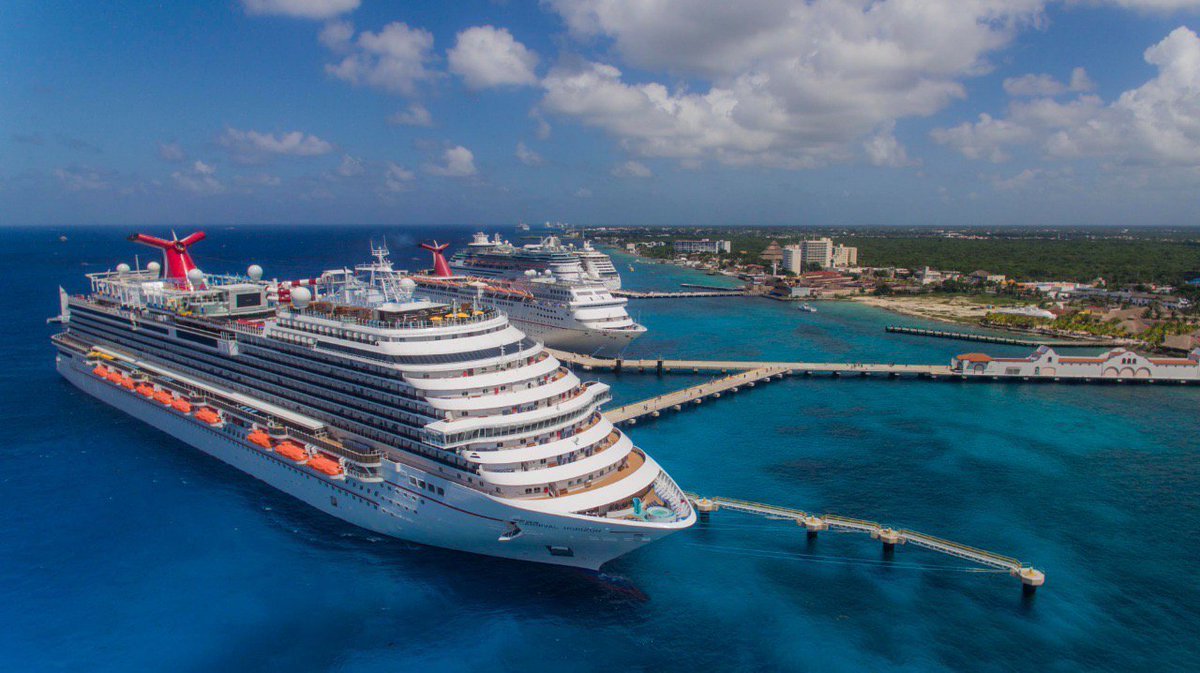The new dock would give the island the ability to receive 18,000 more visitors daily.
Environmental activists opposed to the construction of an additional cruise ship pier on the Caribbean Sea island of Cozumel got a first if inconclusive taste of victory this week: a federal judge ordered the provisional suspension of the project.
The preliminary decision came in response to an injunction request filed by a collective succinctly named “No al cuarto muelle,” or “No to the fourth pier.”
It was the second challenge filed against the planned pier after one submitted by a group of organizations supported by the Mexican Center for Environmental Law.
A reporter for the newspaper El País recently visited Cozumel, part of the Caribbean coast state of Quintana Roo, where she spoke with a range of people opposed to the construction of an 800-meter pier and cruise ship terminal, one of numerous infrastructure projects announced in October 2020 as part of a pact between the federal government and the private sector.
“… If the growth of the cruise industry continues, all the tourists who come here to stay for one or two weeks to dive and visit the jungle on the other side of the island won’t come anymore because they won’t have any reason to come. There will be other places where they won’t permit cruise ships and where they will have reefs and where they will prefer to go,” said Germán Méndez, a marine biologist and founder of the organization Coral Reef Restoration.
“We’re killing the hen that laid the golden eggs because at the end of the day this – our coral – is the only thing that differentiates us from other tourism destinations. But it’s the first thing that we’re killing off,” he said.
“Everything that we just saw will disappear,” Méndez told El País after a dive in the sea where the pier is slated to be built.
“They say there is nothing but I think that the people who say there isn’t anything haven’t gone in with a mask to see what there is,” he said.
There are in fact 20 species of coral in the reef – the last outside Cozumel’s marine national park, El País reported.
The newspaper said the section of coast where a private company intends to build the new pier is “coveted” by locals.
“Entry here isn’t charged in dollars like in the beach clubs designed for tourists. There are no frozen margaritas or straws in the form of umbrellas; just a public space, of the kind of which there are fewer and fewer, where those who don’t have much can feel rich looking at the turquoise sea while the sun tinges the horizon red. If the pier is built, this area will close to the public,” El País said.
“The question is why do they want to build another pier if those that already exist have never been fully used,” said Guadalupe Martín Cab, president of Cozumel environmental conservation group CIMAC.
Located off the coast of Playa del Carmen, the island – the world’s busiest port of call for cruise ships before the pandemic – already has three piers for international cruise ships. But their usage didn’t exceed 54% of capacity in either 2018 or 2019, El País reported.
“They’ve never filled all the [docking] stations at the same time,” Martín said.
“… We’ve filed a lawsuit and the lawsuit has been accepted and we hope that it … manages to stop this [additional pier]. We’re also collecting signatures to ask for … a public consultation so our voices are heard,” she said.
Muelles del Caribe, the company awarded a concession to build and operate the planned pier and terminal, went some way to answering Martín’s question.
“Piers are obviously built for future rather than current operations,” it said in a statement, apparently indicating that it believes that an additional pier will spur greater demand for cruise ship travel to Cozumel, as former Quintana Roo tourism minister Marisol Vanegas predicted will occur.
Tens of thousands of cruise ship passengers already alight in Cozumel on a busy day, and up to 18,000 more could visit if the proposed pier is built, El País said. That would place even greater pressure on the island’s already-stretched infrastructure, including limited wastewater treatment services.
“In a single day you can have 40,000 or 50,000 people per day getting off the ships. To entertain them you have to build different places. So what do they build? Beach clubs. Where do they build the beach clubs? In front of the marine park where there is no treatment plant; so all the waste from hotels, private houses and beach clubs is ending up in the sea,” Méndez said.
Cozumel is Mexico’s No. 1 cruise ship destination, accounting for 43% of visits in 2020. Passenger numbers totaled 4.56 million in 2019, but plunged to 1.13 million the following year due to the coronavirus pandemic.
Miriam Moreno, a diver and member of the conservation organization Coral Hero, told El País that reefs off the coast of Cozumel won’t last long if they continue to be managed in the way that is currently occurring. Construction of a new pier would only exacerbate the problem by threatening a reef already at risk.
“And divers usually look for live sites [healthy reefs], not dead ones,” Moreno said, sharing Méndez’s concern that tourism – upon which Cozumel is heavily dependent – will dry up if the island doesn’t conserve its most beautiful and alluring attraction. (https://mexiconewsdaily.com/news/cruise-ships-cozumel-pier-opposition/)
With reports from El País



































